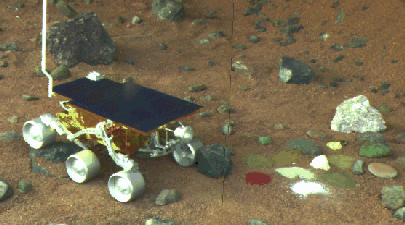

PUBLIC INFORMATION OFFICE
JET PROPULSION LABORATORY
CALIFORNIA INSTITUTE OF TECHNOLOGY
NATIONAL AERONAUTICS AND SPACE ADMINISTRATION
PASADENA, CALIF. 91109. TELEPHONE (818) 354-5011
Contact: Diane Ainsworth
FOR IMMEDIATE RELEASE July 14, 1995
NASA NAMES FIRST ROVER TO EXPLORE THE SURFACE OF MARS
On the 30th anniversary of Mars exploration, NASA has
selected the name "Sojourner" for the first rover to explore the
planet. The 11.5-kilogram (25-pound), six-wheeled robotic
explorer is now being readied for launch, and will roam across an
ancient Martian flood plain after its companion lander, Mars
Pathfinder, touches down on the surface on July 4, 1997.
The U.S. spacecraft Mariner 4 ushered in the beginnings of
humanity's detailed exploration of the Red Planet 30 years ago
today when it flew by Mars at a distance of about 10,000
kilometers (6,000 miles) on July 14, 1965, taking the first close-
up images of another planet.
The name Sojourner was chosen for the Mars Pathfinder rover
after a year-long, worldwide competition in which students up to
18 years old were invited to select a heroine and submit an essay
about her historical accomplishments. The students were asked to
address in their essays how a rover named for their heroine would
translate these accomplishments to the Martian environment.
Initiated in March 1994 by The Planetary Society of Pasadena,
Calif., in cooperation with NASA's Jet Propulsion Laboratory, the
contest got under way with an announcement in the January 1995
issue of the National Science Teachers Association's magazine
"Science and Children," which is circulated to 20,000 teachers and
schools across the nation.
Valerie Ambroise, 12, of Bridgeport, Conn., submitted the
winning essay about Sojourner Truth, an African-American reformist
who lived during the tumultuous era of the U.S. Civil War. An
abolitionist and champion of women's rights, Sojourner Truth,
whose legal name was Isabella Van Wagener, made it her mission to
"travel up and down the land," advocating the rights of all people
to be free and the rights of women to participate fully in
society. The name Sojourner was selected because it
means "traveler."
JPL scientists and engineers working on the Mars Pathfinder
project and Planetary Society staff members reviewed the 3,500
total entries received from all over the world, including essays
from students living in Canada, India, Israel, Japan, Mexico,
Poland and Russia. Nearly 1,700 of the essays were submitted by
students aged 5 to 18 years old and met all of the qualifying
criteria.
The selection of winners from this group by representatives
of JPL and NASA Headquarters was based on several factors: the
quality and creativity of the essay, taking into consideration the
age of each contestant; the appropriateness of the name for a Mars
rover; and the knowledge and understanding of the Pathfinder
rover's mission conveyed in each essay.
The second place prize winner was Deepti Rohatgi, 18, of
Rockville, Md., who proposed naming the rover after Marie Curie, a
Polish-born chemist who won the Nobel Prize in 1911 for her
discovery of the elements radium and polonium. The third place
prize goes to Adam Sheedy, 16, of Round Rock, Texas, who chose the
late astronaut Judith Resnik as his namesake for the new rover.
Other popular names included Sacajewea, who explored North
America with Lewis and Clark; Amelia Earhart, one of the first
female aviators; Athena, the Greek goddess of wisdom; Harriet
Tubman, a 19th-century African-American writer and political
reformist; Greek goddesses Minerva and Atalanta; and Thumbelina,
the tiny fairy tale character created by Hans Christian Andersen.
The Mars Pathfinder lander and rover will be launched in
December 1996 aboard a Delta rocket and then will spend seven
months cruising to Mars. The mission will demonstrate a new, low-
cost way of entering a planetary atmosphere and landing through a
combination of parachutes, rockets and shock-absorbing airbags
designed to slow the spacecraft's descent and place it safely on
the surface. Once Pathfinder lands and opens its exterior petals,
the solar-powered rover will be sent off to explore the chemistry
of rocks in the area and other features of the planet's rocky
surface.
Mars Pathfinder is part of NASA's Discovery program, a new
generation of low-cost spacecraft designed to explore the solar
system. The mission is managed by the Jet Propulsion Laboratory
for NASA's Office of Space Science and Office of Space Access and
Technology, Washington, D.C.
#####